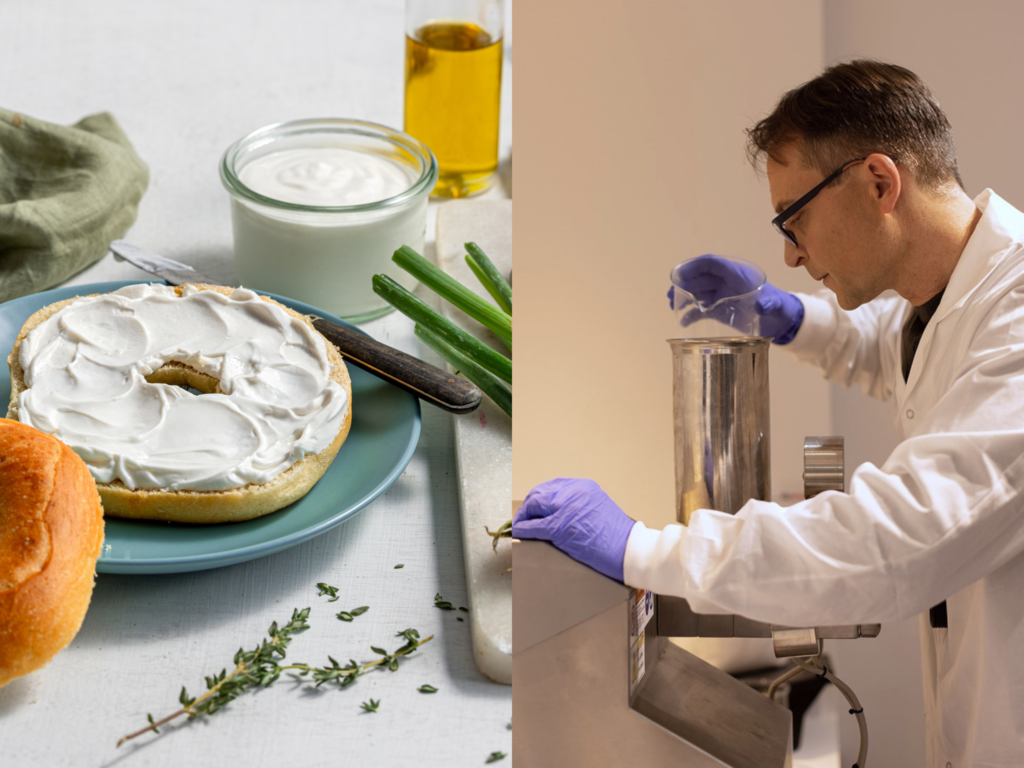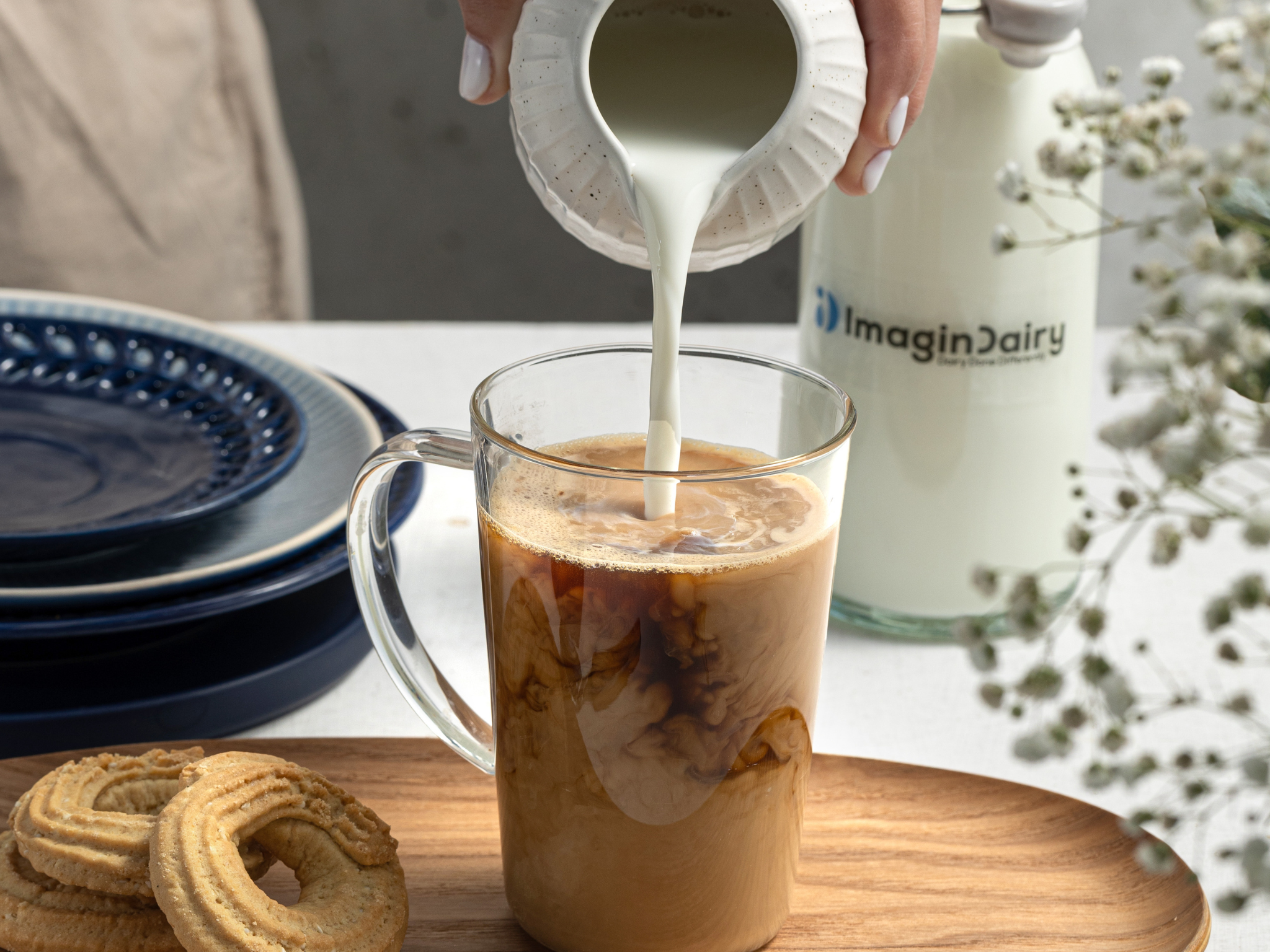5 Mins Read
Precision fermentation startup Imagindairy has received regulatory approval for its animal-free whey protein in Israel, as it closes in on its latest fundraising round.
Israeli startup Imagindairy can now sell its cow-free whey protein to manufacturers for consumer use in its home country, after obtaining the greenlight from the Ministry of Health.
The regulatory nod validates the safety of the firm’s beta-lactoglobulin protein, and follows its approval in the US, where it obtained a ‘no further questions’ letter from the Food and Drug Administration in January.
It makes Imagindairy the second precision fermentation company to be allowed to sell its protein in Israel, after Rehovot-based Remilk. The latter is also commercialising beta-lactoglobulin, the main whey protein found in dairy, which can be used as a base for cow-free milk, cheese, yoghurt, ice cream, and more.
Precision fermentation combines the process of traditional fermentation with the latest advances in biotechnology to efficiently produce a compound of interest, such as a protein, flavour molecule, vitamin, pigment, or fat.
Food tech – specifically alternative protein – has been recognised by Israel as one of its top five priority R&D areas. Companies in the country attracted 10% of all VC funding in the future food sector between 2014 and 2023, and the industry is expected to create 10,000 additional jobs and contribute $2.5B to Israel’s economy by 2030.
Imagindairy can produce whey at price parity on industrial scale

While Imagindairy is also working on casein (which makes up 80% of dairy protein content) in the background, its major focus has been on beta-lactoglobulin, which accounts for 65% of all whey found in milk. This is said to be nutritionally superior to most proteins, and has gelling, foaming and emulsification properties that enhance the texture of a range of food and beverage products.
Beta-lactoglobulin also contains a larger concentration of essential and branched-chain amino acids than other whey proteins (such as leucine, which is key for muscle synthesis). Plus, it’s tasteless, stable across a wide pH range, and tolerant to heat.
These attributes have made it the most popular precision-fermented protein, with a host of companies in the space producing beta-lactoglobulin, including Californian pioneer Perfect Day, Dutch startup Vivici, Danish player 21st.Bio, New Zealand’s Daisy Lab, and Remilk.
For its version, Imagindairy employs an AI-led microflora-based production method, which feeds microorganisms that are 20 times more efficient than cows at converting feed into proteins. It is using a fungus strain called Aspergillus oryzae, more commonly known as koji mould. It’s often described as Japan’s “national fungus” and is used in many traditional fermented products like miso, mirin, shoyu, and soju.
Imagindairy’s whey protein is identical in taste, texture and nutritional value to its cow-derived counterpart, and is free from cholesterol, lactose and hormones. Producing it via precision fermentation also dramatically shrinks its climate footprint – Perfect Day’s beta-lactoglobulin, for example, has up to 97% lower GHG emissions, 60% lower energy demands, and 99% less water consumption than conventional whey.
The process is based on over 15 years of research, and leverages computational and molecular biology technologies to make it cost-effective. And in January, it began operating an industrial-scale facility with a 100,000-litre fermentation capacity, which has allowed it to produce prototypes at the same price as conventional dairy, or even cheaper.
A bumper year for regulatory approval of precision fermentation

“The approval from the Ministry of Health represents a pivotal achievement for Imagindairy and the entire Israeli food tech industry,” said Jonathan Berger, CEO of The Kitchen FoodTech Hub, an incubator programme by the Strauss Group that launched Imagindairy back in 2020.
“This is another step that brings breakthrough technology to the consumer shelf. We have been backing Imagindairy from day one and we’re extremely proud to see the team achieve outstanding accomplishments time after time,” he added.
Eyal Afergan, co-founder and CEO of Imagindairy, remarked: “We are excited to bring our products to the Israeli market and provide consumers with a quality, healthy dairy experience, without reliance on animals. This approval unlocks additional marketing opportunities and allows us to continue developing sustainable food solutions.”
Speaking to Green Queen, Afergan confirmed that Imagindairy is operating a B2B model, having partnered with dairy and food companies. And while he wasn’t able to disclose its partners’ names due to confidentiality agreements, he said that Imagindairy’s plans to enter the US market are “going well”.
The startup has previously indicated that it planned to debut products in Israel with Strauss, while a strategic investment from Danone also holds potential for collaboration. These companies, alongside VC firms like Target Global, Entree Capital, and Emerald Technology Ventures, have poured over $30M into the business to date.
But now, it’s in the final stages of raising its next round. “The capital will be used to support our commercialisation activities,” revealed Afergan.
This year has been a seminal one for regulatory acceptance of precision fermentation companies. Vivici, 21st.Bio, casein producers New Culture and Fermify, and lactoferrin startup TurtleTree have all obtained self-affirmed Generally Recognized as Safe (GRAS) status in the US, with each now pursuing the FDA’s ‘no further questions’ letter. Remilk gained regulatory approval in Canada, and just this week, Australia’s All G Foods earned the greenlight for its lactoferrin in China.
“We have a go-to-market strategy, and we’ll follow it in terms of regulation to unlock further markets accordingly,” Afergan said when asked about Imagindairy’s plans to file for approval elsewhere. “We view 2025 as a key year in Imagindairy’s growth, which will include commercial launches as well as forging deeper industry partnerships,” he added.



